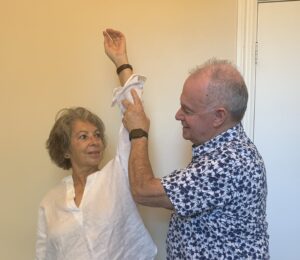
Rotator cuff injuries
The rotator cuff are the tendons of four muscles that originate on the shoulder blade and come together above the shoulder joint. They attach the upper arm bone (humerus) to the shoulder blade.
The rotator cuff are responsible for moving the arm at the shoulder and stabilising the shoulder, but they are the cause for the majority of shoulder pain.
Pain from the rotator cuff can be caused by tears in the tendons, degeneration of the tendons with wear and tear, or tendinopathy of the tendons (this used to be called tendonitis). You can think of tendinopathy as 'stressed' tendons. Tendinopathy often comes from over-use, but can also be caused by under-use of the tendons.
In many cases, torn tendons begin by fraying. As the damage progresses, the tendon can completely tear, sometimes with lifting a heavy object.
Tears of the rotator cuff tendons can be partial thickness tears, full thickness tears, or complete ruptures of the tendons.
There are two main causes of rotator cuff tears: injury and wear (degeneration). If you fall down on your outstretched arm or lift something too heavy with a jerking motion, you can tear your rotator cuff.
Most tears are the result of a wearing down of the tendon that occurs slowly over time. This degeneration naturally occurs as we age and in most cases is relatively painless.
Because most rotator cuff tears are largely caused by the normal wear and tear that goes along with aging, people over 40 are at greater risk.
People who do repetitive lifting or overhead activities are also at risk for rotator cuff tears. Athletes are especially vulnerable to overuse tears, particularly tennis players and baseball pitchers. Painters, carpenters, and others who do overhead work also have a greater chance for tears.
Although overuse tears caused by sports activity or overhead work also occur in younger people, most tears in young adults are caused by a traumatic injury, like a fall.
A major issue that contributes to degenerative rotator cuff tears is repetitive stress.
Repeating the same shoulder motions again and again can stress your rotator cuff muscles and tendons. Baseball, tennis, rowing, and weightlifting are examples of activities that can put you at risk for overuse tears. Many jobs and routine chores can cause overuse tears, as well.
Dr. Phillip Hughes completed his Doctorate by investigating the diagnosis of tendon damage. He is able to diagnose rotator cuff tendon injuries, in oder to formulate an effective and timely treatment plan.